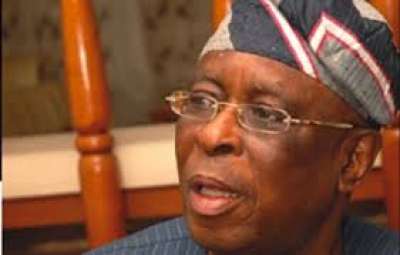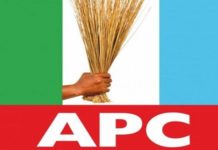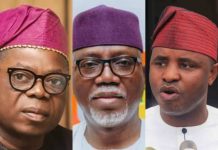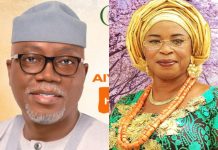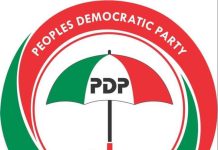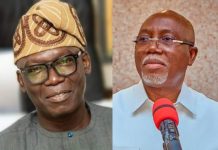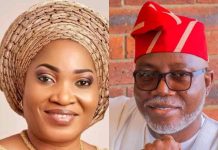
Former Ogun State Governor and chieftain of the All Progressives Congress (APC), Chief Olusegun Osoba, has sensationally revealed how elders of the Yoruba socio-political group, Afenifere and the defunct Alliance for Democracy (AD), destroyed Chief Olu Falae’s chance of becoming Nigeria’s president in 1999.
Osoba, a former Managing Director of Daily Times, made the revelation in an interview with journalists, ahead of the public presentation of his memoir “Battlelines: Adventures in Journalism and Politics,” which is due for public presentation, Monday, July 8, as part of activities marking his 80th birthday. He spoke on other issues.
Can you give us an insight into some of your adventures in life, and why you chose journalism as a career?
I found myself in journalism by accident. I was to study law because my closest teacher in school, the late Chief Adenola Oshuneye wanted me to study law. He was even furious that I decided to go into journalism because I had admission into the University of Lagos to study law but Alhaji Babatunde Jose persuaded me to jettison the idea of reading law and take up journalism. In my school days, I was a regular writer in the school magazine called the Magnate at Methodist Boys High School, Abeokuta.
The attraction to journalism is the challenge because a good journalist faces challenge every day. Journalism is adventurous and educative, you learn every day. Journalism gives exposure. And for someone, who is streetwise like me, I found journalism a great profession because you have the ability and training to relate with all sectors of the society including armed robbers, prime ministers, parliamentarians and even petty thieves. For instance, I started my career as a journalist covering little crimes. A journalist must be comfortable with all sectors of the society. It is a great training ground that helped me in my years as a politician. Journalism trains someone to be a leader and to be objective. The profession trains someone to accept other peoples’ opinion because most of the times we publish articles and stories that we disagree totally with. A journalist’s duty is to report issues so that the public would make their judgment.
To what extent did Babatunde Jose influence your rise in journalism?
After my childhood days and I decided to go into journalism, Alhaji Jose truncated my studying law and immediately made me to go to University of Lagos in 1965. Alhaji Jakande brought the International Press Institute Training in Nairobi to Lagos. We were the pioneer people in University of Lagos. The course later metamorphosed into the Department of Mass Communications of the University of Lagos. In 1965, expatriates were sent from the International Press Institute in London to the University of Lagos. And at the time I left the University of Lagos in 1965, Alhaji Jose sent me to the UK for a course under the Commonwealth Press Union. Within two years of joining Daily Times, I had done two major courses in journalism. As at 1970, I had gone to Indiana University, Bloomington for another Diploma course in journalism. It was as if Alhaji Jose was preparing me early for something big in journalism. When people say that I didn’t go to the university, I wonder if someone who attended these institutions and attended Harvard University for a postgraduate course is not educated in their sight. What did they do that I have not done. To have been qualified as Nieman fellow is one of the greatest honours in America because the fellowship is limited to 15 people annually and I did a year postgraduate course in Harvard University.
But some said that Jose liked you specially …
They said I was Alhaji Jose’s lapdog. That was why I decided to go to Herald after the crisis in Daily Times to prove myself. If I was that lapdog or favourite, who didn’t know the job, how come the paper succeeded? Without being immodest, there is no newspaper I managed that I ever collected subvention from the Federal Government. I made profit in Herald and turned around Sketch when I started managing it. At Sketch, I build new office complex, and bought new equipment. By the time I came back to Daily Times, the NPN had destroyed it but I turned it around to the extent that we were paying dividends to shareholders. Would a man, who didn’t know his left from his right and who they said became editor by favouritism, have been able to lead Daily Times? I am proud to say that I am one journalist in Nigeria who managed three major newspapers and made them profitable. I paid salaries as and when due and provided housing and car loans.
Apart from managing three successful newspapers, I am involved in the Vanguard and The Guardian, which are major newspapers. When people talk, they don’t know that the idea of starting The Guardian was Alex Ibru and mine. That was why the managing directorship was reserved for me for years.
Can you recall your days as a member of the defunct Constituent Assembly?
That was the beginning of my foray into politics. I was a member of the People Solidarity Party (PSP), which metamorphosed into Social Democratic Party (SDP).
Two- party system is the best for Nigeria. That is why I said the mistake Babangida made on June 12 was destroying the political engineering that had been put in place. The two-party system placed the progressives on one side and the conservatives on one side. At that time nobody defected from SDP to the NRC or from NRC to the SDP. Nobody did that no matter the problem in the respective parties because the ideological divide was very clear. For example, Senator Kofo Akerele-Bucknor became a senator with two votes. The primary that was used then was the Open Ballot System where people queued behind the candidates of their choice to vote. What happened was that Wahab Dosumu was in the forefront to win but there was a disagreement, which made them to boycott the primary. Akerele-Bucknor stubbornly said she was not going to boycott and only two people queued behind her and she won because the SDP said they were boycotting. Her two votes were upheld and she became a senator. In spite of that, neither Dosumu nor the other person left the party. The party still accepted her despite the fact that she was not the first choice. If we had gone with the two- party system, Nigeria would have been a better country today. There was only a little difference between the number of SDP and NRC governors. It was also the same in the Senate. The calibre of those who became governors at the time were high-calibre people. Oyegun, Ezeife, Saidu Bada in Katsina were all retired Federal Permanent Secretaries. The late Dabo Lere of Kaduna was a retired General Manager. Shaba Lafiagi of Kwara State was the General Manager of Bacita Sugar Industry. I was the Managing Director of Daily Times. Otedola was a Personal Assistant to Awolowo. Olumilua had a successful foreign service career. I can go on to name other governors who were people of high calibre exposure. It is different from what we have now.
How do you feel when they call you a military apologist?
The military was in control for many years. Two weeks ago someone said that I was a security agent during the military era. What they don’t know is that many of these officers were Second Lieutenants when I became famous as a result of the Balewa story in 1966. I met some of them in 1961 when I went to Cameroon for Man’O War drills. I always tell them that they are generals in the military while I am a Field Marshal in my profession. These are people who I grew up with. Babangida was one of them. The greatest ‘terror’ in our days was Air Marshal Abas. That was when we used to visit nightclubs all over Lagos. How can I now be an agent of the people I grew up with? Is it not insulting? For instance Babangida and I had interesting social life in Lagos as young people. For instance, in the war front, General Danjuma (rtd) was a Major serving under the late General Shuwa at the First Division, which was the first military formation to start the war. I met all of them in the war front. Danjuma was then a field Lieutenant Colonel, can the man I met in the war front intimidate me? I had hobnobbed with Tafawa Balewa, Adeniran Ogunsanya, Okotie Eboh and others in the parliament, how could my mates intimidate me? I covered Sarduana of Sokoto and Awolwo as well as moving with other high people. Those who called me an agent are limited in scope, they lack contacts and they are envious that I had contacts and influence. As at 1964 I had a telephone which made it possible for me to relate with ministers and other top people.
Wikileaks have been releasing names of agents, have they ever found my name on the Wikileaks list? As the officers were growing in the military, I was also growing in my profession. So, they must be stupid to think that I was a military apologist. I couldn’t have been an apologist and still ran successful newspaper businesses. If I were a military apologist, would I have been able to run newspapers under the military regimes and made profits? For me to make profit means that what I was giving out was acceptable to the readers. For instance, every newspaper has its editorial policy and all staff in the paper must lean in the direction of that policy otherwise you leave. There is no newspaper that is totally free. The freedom of any reporter stops where the editorial policy of the paper starts.
Now to Afenifere, what led to the crisis of confidence within your fold?
Our elders started the breakup of Afenifere with Bola Ige’s issue. The D’Rovans election was the beginning of the end of Afenifere. The details are also in my book but I feel bad that when even in his grave, Ige is still been attacked in writing. And I have challenged the Afenifere elders how many young people are with them now and whom would they hand over the leadership of the group to? Me I am part of the elders and we are beginning to become a total failure. When we all go there would not be an Afenifere because our attitude does not accommodate contrary opinion. I will give you examples, we the Afenifere were registered under AD and Oyegun was part of us. We had a meeting in Kaduna where Oyegun made a suggestion that AD needed a spread to enable it win the presidential election, and he said why don’t we collaborate with All Peoples Party (APP) under Mahmoud Waziri? If you see how our elders lambasted Oyegun to the point that he was kicked out of AD, yet Oyegun suffered more than anybody in exile. He was kicked out and at the end of the day our father didn’t provide alternative because they are one-way thinker. But they later returned to what Oyegun had suggested earlier but by then the elected APP governors were against us. If they had cooperated with us there was no way Obasanjo could have won the 1999 presidential election. That is why I always hit hard at all the elders that they are the ones who destroyed AD’s opportunity of winning the 1999 presidential election because the whole country had conceded the presidency to Yoruba and Falae was in the forefront to win.
Our leaders are always one-way route and once you come up with alternative suggestion, you become an enemy. They don’t read history. When you are fighting for a cause, there must be alternative agenda. Take for example restructuring; we are all for restructuring and true federalism and you keep saying you want it right and now. Is there any provision in the constitution where the president is empowered to by decree restructure? I have been telling them to let us engage the National Assembly but they will go to the pages of the newspaper shouting to the top. When these elders met the 8th National Assembly under Bukola Saraki and Yakubu Dogara, the President of the Senate and Speaker of the House respectively, late last year and discovered many of the things that have been done and how far the lawmakers have gone to approve certain amendments in the constitution, they were surprised. I challenged them to come out and tell me what they came out with after their engagements with the National Assembly.


